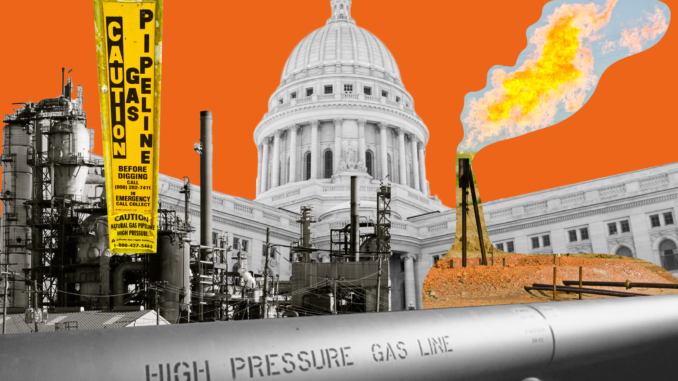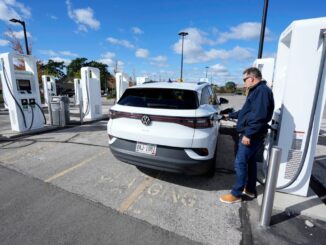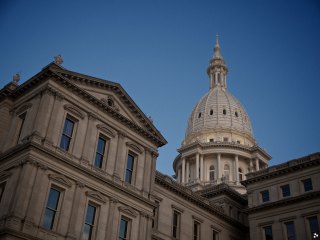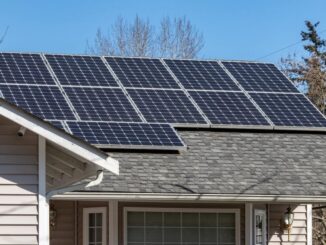
WEC Energy is throwing its weight behind bills that would safeguard utilities’ reliance on fossil fuels.
Wisconsin Republicans spent the summer pushing for laws that prevent local governments from banning the use of fossil fuels in their communities. Gov. Tony Evers recently vetoed two of these bills, a move heralded by state environmental and clean energy groups.
“Once again, the legislature was attempting to take away the ability for local governments to make decisions about their communities,” says Jennifer Giegerich, government affairs director of Wisconsin Conservation Voters, in a statement.
“As our state and nation have faced a summer of record heat, flooding, and dangerous air quality from wildfire smoke, it’s impossible to ignore the reality of climate change,” says Clean Wisconsin spokesperson Erik Kanter in a celebratory, post-veto statement. “If Wisconsin communities want to do all they can to curb carbon emissions and cut air pollution, they should be allowed to do so without interference from the state legislature.”
Even Governor Tony Evers addressed the perils of climate change when vetoing the Senate bill, saying that the legislation could jeopardize the state’s future ability to transition away from fossil fuels or “collectively combat climate change.”
But long before these bills reached Evers’ desk, the state’s largest power company was hard at work pushing legislators to stall a clean energy transition.
Emails between lawmakers and WEC Energy, the parent company of both WE Energies and Wisconsin Public Service Corporation, show the company’s lobbyists advocating for Wisconsin to replicate restrictive energy laws seen around the country. WEC Energy is an electricity and natural gas provider to over 4 million customers, primarily in the Midwest. The records were provided to Tone Madison by the Energy and Policy Institute, a national nonprofit utility watchdog organization.
Earlier this year, Republican lawmakers introduced legislation in both the Wisconsin Assembly and the State Senate that would prevent Wisconsin municipalities from enacting ordinances that bar utilities from using fossil fuels to generate power. This legislation seeks to continue a years-long pattern of preemption laws, as they’re called, that state-level authorities use to stop local governments from creating their own policies dealing with issues from housing to gun control.
Consumers want clean energy, but state utilities are delaying the transition by keeping fossil fuel-burning power plants open. Utilities are, according to state records, lobbying elected officials to support legislation that would prolong this transition. Utilities have also started to raise prices on monthly energy bills, and the government body responsible for approving the increases in energy bill prices is a “revolving door” between government and private industry officials.
Lobbying to keep the “good stuff” burning
In a March email, WEC Energy lobbyist Chris LaRowe shared news of recently passed legislation in Tennessee that stops local governments from preventing the installation of gas-powered stoves after a national uproar. The lobbyist called the legislation “good stuff” in an email to the offices of Representative Daniel Knodl (R-Germantown) and Senator Julian Bradley (R-Franklin), who are both lead authors of the Wisconsin bills in the Assembly and Senate, respectively.
Bradley and Knodl’s proposals are similar to state-level laws in effect or under consideration around the country that would stop local governments from preventing fossil-fuel hookups in newly constructed buildings. Neither lawmaker responded to requests for comment for this story.
Berkeley, California in 2019 became the first city in the country to ban natural gas in new buildings in order to reduce its dependence on the fossil fuel sector. Earlier this year, a court struck down the city’s ordinance, leaving many more cities worried about their own, similar legislation.
While right-wing pundits and federal lawmakers have waged a predictable culture war over gas stoves by saying things like “If the maniacs in the White House come for my stove, they can pry it from my cold dead hands,” there is real concern over the harmful effects of methane gas, otherwise known as natural gas, on both the planet and public health. Methane, the primary ingredient in natural gas, traps more heat in the planet’s atmosphere than carbon dioxide, and research shows it is linked to roughly 30% of global temperature rise to date. In addition to methane, compounds like benzene are found in “natural gas,” which has been linked to health risks such as asthma, immunity issues, and cancers.
Karlee Weinmann, a researcher with the Energy and Policy Institute, says the gas utility industry uses the money it makes from customers to lobby officials and subverts the transition to clean energy.
“What we’re seeing in Wisconsin now is what we’ve seen in other states,” Weinmann says, “which is the gas utility trying to hold Wisconsin back when it’s more essential than ever to be moving forward and addressing the climate crisis.”
According to state lobbying records, WEC Energy self-reported that it had spent roughly $133,862 on lobbying from January to the end of June this year. The records show that the company spent 4% of its 307 logged lobbying hours on efforts related to both the state Senate and Assembly bills that would preemptively ban fossil fuel bans.
Records show that WEC’s lobbying time has been divided between similar legislation, such as bills in both houses that would increase permitting and notice requirements for large solar projects.
But WEC Energy is not alone in its support for these bills. According to the state’s lobbying tracking website, industry players such as the American Petroleum Institute, Alliant Energy, the Tavern League of Wisconsin, the Koch Brothers-founded
For Prosperity, and Wisconsin Manufacturers and Commerce, all support these bills in both the Assembly and Senate.
In a statement provided to Tone Madison, WEC Energy spokesperson Brendan Conway says the company supports the bills, which are based on similar legislation passed in 25 other states, because they prevent a patchwork of rules and regulations that vary from city to city and county to county.
“This measure allows customers to continue to make their own energy choices—whether they want to put solar panels on their roofs or use a gas stove to make dinner,” Conway says.
Move the goalposts, raise the price
As the country’s eighth-largest natural gas distributor, WEC Energy has a lot at stake, and potentially a lot to lose, in any transition to renewable energy. The company says it will be carbon-neutral by 2050. Still, it launched a new natural gas operation last year, which is powered by “synthetic and carbon-neutral” methane. According to a 2022 report from the Public Service Commission, almost all of the state’s five biggest utilities will fall short of their 2030 emissions reduction targets, including WE Energies and Wisconsin Public Service. On the other hand, WEC companies are major investors in large-scale solar operations in Wisconsin and Texas.
At the end of 2022, WEC Energy proposed price increases of 8.8% for We Energies and 9% for Wisconsin Public Service. The Wisconsin Public Service Commission approved the rate hikes, while Milwaukee officials derided the increase.
The Energy and Policy Institute also points to the close ties between the government body that regulates power companies and the utilities themselves.
After leaving the PSC in March, Ellen Nowak, a former Scott Walker-appointed PSC commissioner, recently took an executive position at the American Transmission Company, a utility subsidy of WEC.
Nowak has a history of opposing clean energy transition. During her time in office, she appeared in a pro-coal promotional video, attacking 2035 decarbonization projections. The former PSC executive looks back fondly on her opposition, according to a recent report from Wisconsin Public Radio. The network reported that during her time with the PSC, she testified against former President Barack Obama’s Clean Power Plan, which would have reduced carbon pollution from power plants.
Last year, the PSC approved a natural gas plant near Wausau. The plant, which replaced coal operations, was decried by the state’s environmental and clean energy groups. At the time, Nowak told the Milwaukee Journal-Sentinel that she would prefer for the utilities to keep burning fossil fuels for longer than they currently plan to.
Wisconsin utilities have moved the goalposts in their plan to decarbonize, with utilities saying they are delaying the retirement of Wisconsin coal-fired power plants. While they seek higher energy costs for consumers, these powerful businesses are using funds from those energy bills for lobbying, locking consumers and the state’s energy sector in a precarious loop.



